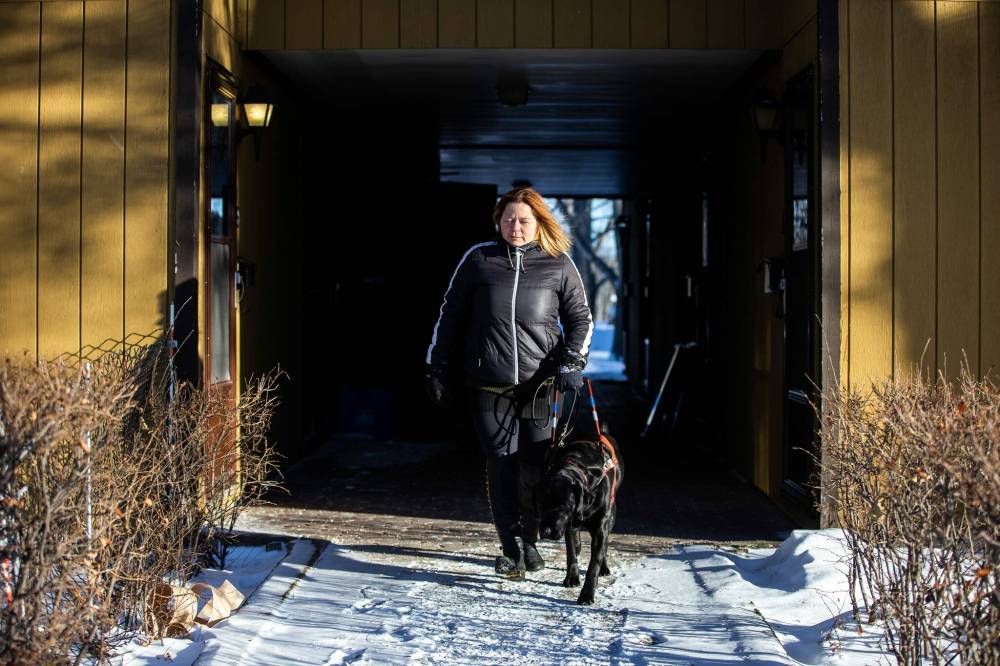Uber drivers say no to woman’s guide dog Service animal clearly identified but unwelcome in consecutive vehicles
Read this article for free:
or
Already have an account? Log in here »
To continue reading, please subscribe:
Monthly Digital Subscription
$0 for the first 4 weeks*
- Enjoy unlimited reading on winnipegfreepress.com
- Read the E-Edition, our digital replica newspaper
- Access News Break, our award-winning app
- Play interactive puzzles
*No charge for 4 weeks then price increases to the regular rate of $19.00 plus GST every four weeks. Offer available to new and qualified returning subscribers only. Cancel any time.
Monthly Digital Subscription
$4.75/week*
- Enjoy unlimited reading on winnipegfreepress.com
- Read the E-Edition, our digital replica newspaper
- Access News Break, our award-winning app
- Play interactive puzzles
*Billed as $19 plus GST every four weeks. Cancel any time.
To continue reading, please subscribe:
Add Free Press access to your Brandon Sun subscription for only an additional
$1 for the first 4 weeks*
*Your next subscription payment will increase by $1.00 and you will be charged $16.99 plus GST for four weeks. After four weeks, your payment will increase to $23.99 plus GST every four weeks.
Read unlimited articles for free today:
or
Already have an account? Log in here »
Hey there, time traveller!
This article was published 30/11/2022 (1105 days ago), so information in it may no longer be current.
A visually impaired Winnipegger is considering filing a human-rights complaint after she was denied two consecutive Uber rides because of her guide dog.
Veronika Kanya says she was shocked when she and her clearly identified service dog — a five-year-old black Labrador retriever named Apache, who was wearing his labelled leather harness — were refused rides in St. James on Sunday because the drivers balked at having a dog in their cars, even after Kanya explained to them she’s blind and her dog is not a pet.
“The guy just said, ‘No dogs. Uber rule, no dogs.’ And I explained to him, I was very polite… there’s going to be repercussions. I said, ‘I’m going to be filing a complaint.’ And he’s, like, ‘OK.’ Just, ‘no dogs,’ and he drove away.”

The ride-hailing app automatically dispatched another ride.
“The second driver showed up, and it was exactly the same thing,” she said.
On the third try, the driver picked them up without question, and after she told him what had just happened, he replied, ‘We’re not allowed to say no; everyone knows service dogs are allowed.’”
Apparently not, Kanya says now, explaining she felt “a bit flabbergasted,” as if she’d been thrown back in time. She lost her eyesight 24 years ago when she was in her early 20s and has been paired with three different guide dogs over the past two decades. Over the years, she’s noticed resistance to accommodating her service dog has become rare.
“I thought things have changed so much already with advocacy and awareness, but no. This is a real issue,” she said.
Kanya submitted an in-app complaint following Sunday’s incident. After contacting reporters about it, she said she received an apologetic phone call from an Uber representative Wednesday afternoon. She was informed Uber is investigating the incident and will contact her about the outcome when it is complete.
She was told the two drivers have had their accounts suspended during the investigation, she said.
In a statement, an Uber spokesperson confirmed the company is investigating.
“We are disappointed by Veronika’s experience, and we share in her frustration. Our Community Guidelines clearly states that drivers cannot deny someone a trip because of their service animal. Anyone who uses the Uber platform to drive agrees to abide by the policy. We have a special team looking into this case and will take appropriate action.”

Uber’s policy for service animals is posted on its website. It makes clear drivers must follow Canadian laws and are not allowed to refuse service dogs or discriminate against people with disabilities. Drivers could be banned from the app for doing so, the policy states.
Guide-dog users are still refused entry to businesses and denied taxis or ride-shares all the time in Canada because of a lack of public awareness of the law, says Larissa Proctor, manager of guide-dog advocacy for the Canadian National Institute for the Blind.
Proctor, who is based in Ontario and uses a guide dog, filed an Uber in-app complaint and received a refund after a driver cancelled a ride request upon learning Proctor was accompanied by a service dog. Similar complaints come in to CNIB on a weekly basis, Proctor said, adding the organization has been in touch with Uber about it and the company is being collaborative to deal with the issue.
“They’re aware of the problem,” Proctor said.
“We do get regular complaints, not just about Uber, but about other taxis and ride-sharing companies,” as well as hotels, restaurants and other businesses.
“I think a lot of it is just lack of awareness that guide dogs belong everywhere and it’s the law.”
Service animals must be allowed in any place the public is allowed, under the law. Manitoba’s human rights code is broader than some other provinces because it recognizes any type of animal — not just dogs — as service animals and doesn’t require formal certification for support animals. (More information on Manitoba’s service dog guidelines is posted here.)
Only two cases involving service dogs have resulted in a human-rights tribunal decision over the past 20 years, but the Manitoba Human Rights Commission receives many complaints from service-dog users denied access to housing, transportation, employment and businesses.
“It is an issue of common concern for Manitobans,” said Karen Sharma, the commission’s executive director.
Complainants could be eligible for compensation of up to $25,000 if the tribunal rules they were discriminated against because of service dogs. In 2020, it ruled in favour of a service-dog user who was denied access to a Manitoba resort, emphasizing the animals are not pets.
Kanya said she’s happy Uber is addressing the problem but is hoping for wider acceptance. Her guide dog is her pride and joy, she said, adding that being refused rides because of Apache left her frustrated, “even embarrassed, which is ridiculous.”
“I don’t often think about myself as disabled or blind, although I am… I make the most of life, regardless, and then something like this happens.”
katie.may@winnipegfreepress.com

Katie May is a general-assignment reporter for the Free Press.
Our newsroom depends on a growing audience of readers to power our journalism. If you are not a paid reader, please consider becoming a subscriber.
Our newsroom depends on its audience of readers to power our journalism. Thank you for your support.









